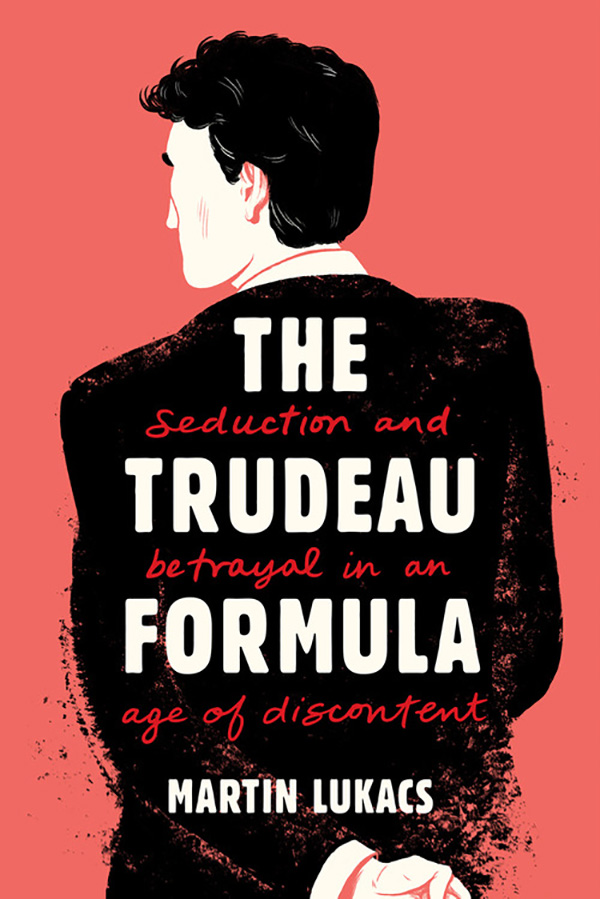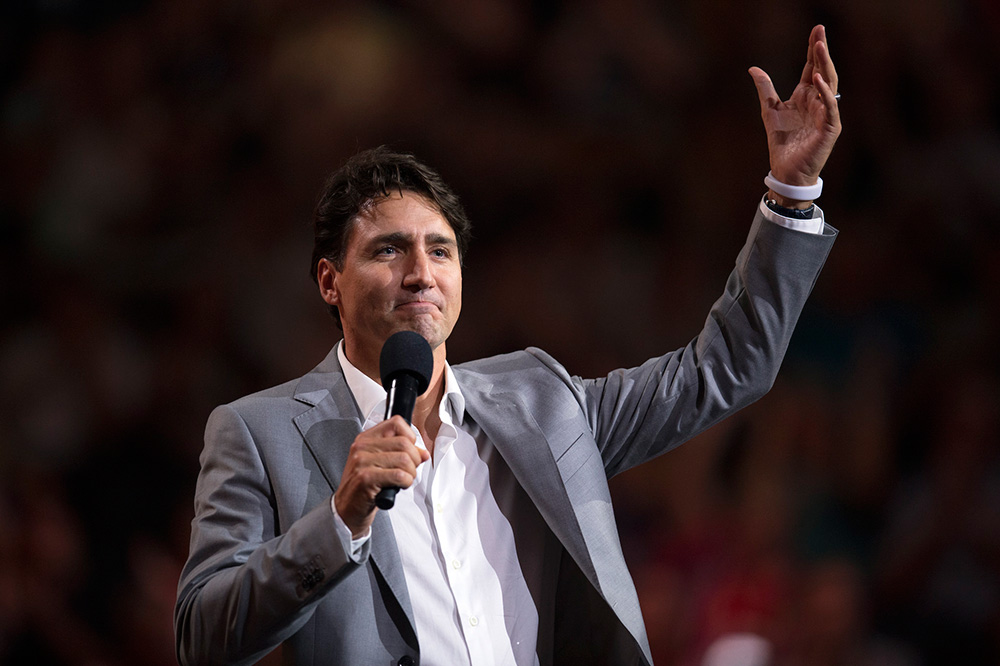Talk a good game about transforming society on behalf of the 99 per cent, while secretly assuring the one per cent that they have nothing to worry about.
That’s the political strategy that defines Canada’s Liberal party, according to Martin Lukacs, a long-time investigative journalist and Guardian contributor whose new book The Trudeau Formula is being released this month. Activist and author Naomi Klein calls it “a must-read that brilliantly maps the inner logic of the Trudeau years.”
Lukacs told The Tyee that Prime Minister Justin Trudeau’s approach to politics serves the powerful.
“The Liberals effectively act as a kind of shock absorber of discontent and anger towards the elite,” he said. In his book, Lukacs describes sneaking into the Laurier Club lounge for high-level donors to the Liberals in April 2018. Corporate lobbyists circled federal ministers “like teenagers at a high school dance,” he writes.
Lukacs shared ideas with The Tyee on why Trudeau’s main strength is progressive marketing, how his broken promises are creating an opening for the scapegoating politics of Conservative Leader Andrew Scheer, why the NDP is failing to take advantage of this political moment, and what it will take for ordinary Canadians to create transformative solutions for the climate emergency and extreme inequality. This conversation has been edited lightly for length and clarity.

On the excitement of Trudeau winning the 2015 election
That all had to do with the fact that for 10 years in Canada we lived under Stephen Harper, right? And I think a lot of people experienced this rush of, like, psychic relief — that the belligerent, cruel, hate-mongering politics of Harper had been vanquished. I think the Liberal party played on that strategically. A big part of the marketing of Justin Trudeau was as a direct contrast to Harper both in his individual posture and personality and certainly the broader politics. The other main marketing point was that Canadians were hungry for far-reaching social change, and Trudeau’s team positioned him as someone who would deliver that.
On the Liberal formula for preserving corporate power
The formula distilled to its most simple form is that the Liberal party plays on voters’ desire for far-reaching transformation while guaranteeing the endurance of the status quo. The Liberals effectively act as a kind of shock absorber of discontent and anger towards the elite. Trudeau’s team did that by turning him into the dazzling simulation of defiance against politics as usual.
So on climate, for instance, he was presented as this kind of river-paddling environmental Adonis. He promised that fossil fuel projects wouldn’t go ahead without the permission of communities. But the Liberals create these public spectacles of their bold progressiveness while they quietly assure the corporate elite that their interests will be safeguarded. So at the same time Trudeau was going around the country and convincing people that he was this great climate hope, the Liberal party had for years been assuring big oil and gas interests that there would not be any fundamental change to the status quo.
On why the Liberals are Big Oil’s favourite political party
As early as 2013, Trudeau was telling the Calgary Petroleum Club that he differed with Harper not so much about the necessity of exporting huge amounts of tarsands internationally, but because he didn’t think Harper’s approach — which stoked divisions and an incredible amount of resistance that turned Canada into a climate pariah — was the most effective marketing approach.
The Liberal climate plan essentially is a reworking of the business plan of Big Oil and the broader corporate lobby. Most Canadians probably wouldn’t realize this because of the nature of coverage in the mainstream media and the polarized political debate about the carbon tax, but overwhelmingly there is an astonishing consensus among the corporate elite in support of a carbon tax.
The plan is to support a carbon tax and to effectively make it a cover for expanded tarsands production and pipelines. That was a plan hatched by the Business Council of Canada back in 2006, 2007. For 20 years oil companies had resisted any kind of regulation or any kind of carbon tax and fought it seriously. But they started to realize that it would be a kind of concession that they would have to make in order to assure stability and their bottom line not being harmed. The climate bargain that Trudeau went on to strike with Alberta of a carbon tax plus expanded tarsands production was precisely the deal that Big Oil had wanted.
On how Trudeau is creating an opening for Andrew Scheer
In 2014, a year before the last election, there was this astonishing poll that was done by Ekos. It presented to Canadians a question something like "if wealth continues to accumulate only at the top, I expect violent class conflicts to emerge." Nearly 60 per cent of Canadians agreed with that statement. That sense of discontent has not been reflected back to Canadians in mainstream media coverage. Trudeau initially did a very good job at harnessing that. That said, the policies we’ve gotten from the Trudeau government are really just tinkering at the edges of that discontent, and really just only marginally alleviating the worst aspects of inequality.
What’s interesting is that it’s the right in this country that is now channelling most of the discontent with the establishment and with the status quo. They’re doing it by directing people’s anger and anxieties towards scapegoats, whether that is migrants or people of colour or Indigenous people or so-called foreign-funded radicals. The electoral options from the left haven’t really risen to this moment. Rather than channelling that anger and discontent towards scapegoats, left-wing politicians could be channeling it towards anger at the billionaire and millionaire class like we’ve seen in places like England and the United States.
On the NDP’s failure to take advantage of this political moment
The new deal climate plan that the NDP put forward is certainly the most ambitious and progressive platform the NDP has had in a generation, but the level of funding and speed of response is still woefully lacking, especially compared to some of the climate platforms that are being put out by people like Bernie Sanders. What was striking to me is that the shift in the NDP seemed to happen not because they sensed that there’s a huge political opportunity in Canada to win on that agenda but because the Green party started to nip at their heels.
In terms of popular opinion, support is already there for something like this. An Abacus poll surveyed people’s opinions on a Green New Deal in Canada. It found something as high as 66 per cent support for transformative climate policy if it was paid for by increased taxation on the wealthy and corporations. It’s a question of whether the NDP in particular has the courage to rise to that challenge.
On creating a genuinely progressive alternative in Canada
Ultimately politicians won’t do anything unless their feet are put to the fire by a social movement. As we saw in the U.S., it’s hard to imagine the Green New Deal taking off in the way it did were it not for movements like the Sunrise Movement or the Climate Justice Alliance. We can’t just simply expect the NDP to get its act together. We really have to build a holistic, intersectional social movement that connects the dots between economic, ecological and racial justice.
That requires doing what we tried to do with the Leap Manifesto and what’s currently happening with the Green New Deal, which is not just coming up with a litany of complaints about where the Liberal party is failing, but actually putting forward a compelling alternative that inspires and energizes people.
On why a Green New Deal is political kryptonite to Trudeau
A Green New Deal is basically a clear, distinct roadmap to accomplish everything that Trudeau claimed he champions. It makes very clear that we have to learn to say no to opening new fossil fuel frontiers. Which of course is precisely what the Trudeau government has tried to tell Canadians can’t be done. A Green New Deal tells us that we actually have to engage in reparations and land restitution with Indigenous people.
We can’t just offer the spectacle of symbolic gestures. We can no longer offer an incremental approach to something like the climate crisis. We can’t leave it to the market. We actually have to engage in big, ambitious, government-led public solutions. We simply can’t appeal to the powerful. We have to build a movement that takes on that elite class directly.
That’s a frontal challenge to the establishment centrist politics of the Liberal party. And it’s precisely the kind of politics that could massively improve people’s material lives. You’d potentially create hundreds of thousands, if not millions, of good green jobs, unionized jobs. That raises people’s standard of living. That improves the deteriorating public services that we have. That also is the best way to defeat the rise of ugly right-wing scapegoating, which I don’t think the Liberals are capable of doing. If anything, the kind of policies that the Liberal government has put forward are going to feed and pave the way for the right wing to take power.
The Tyee’s federal election coverage is made possible by readers who pitched in to our election reporting fund. Read more about how The Tyee developed our reader-powered election reporting plan and see all of our stories here. ![]()
Read more: Election 2019, Federal Politics

















Tyee Commenting Guidelines
Comments that violate guidelines risk being deleted, and violations may result in a temporary or permanent user ban. Maintain the spirit of good conversation to stay in the discussion.
*Please note The Tyee is not a forum for spreading misinformation about COVID-19, denying its existence or minimizing its risk to public health.
Do:
Do not: